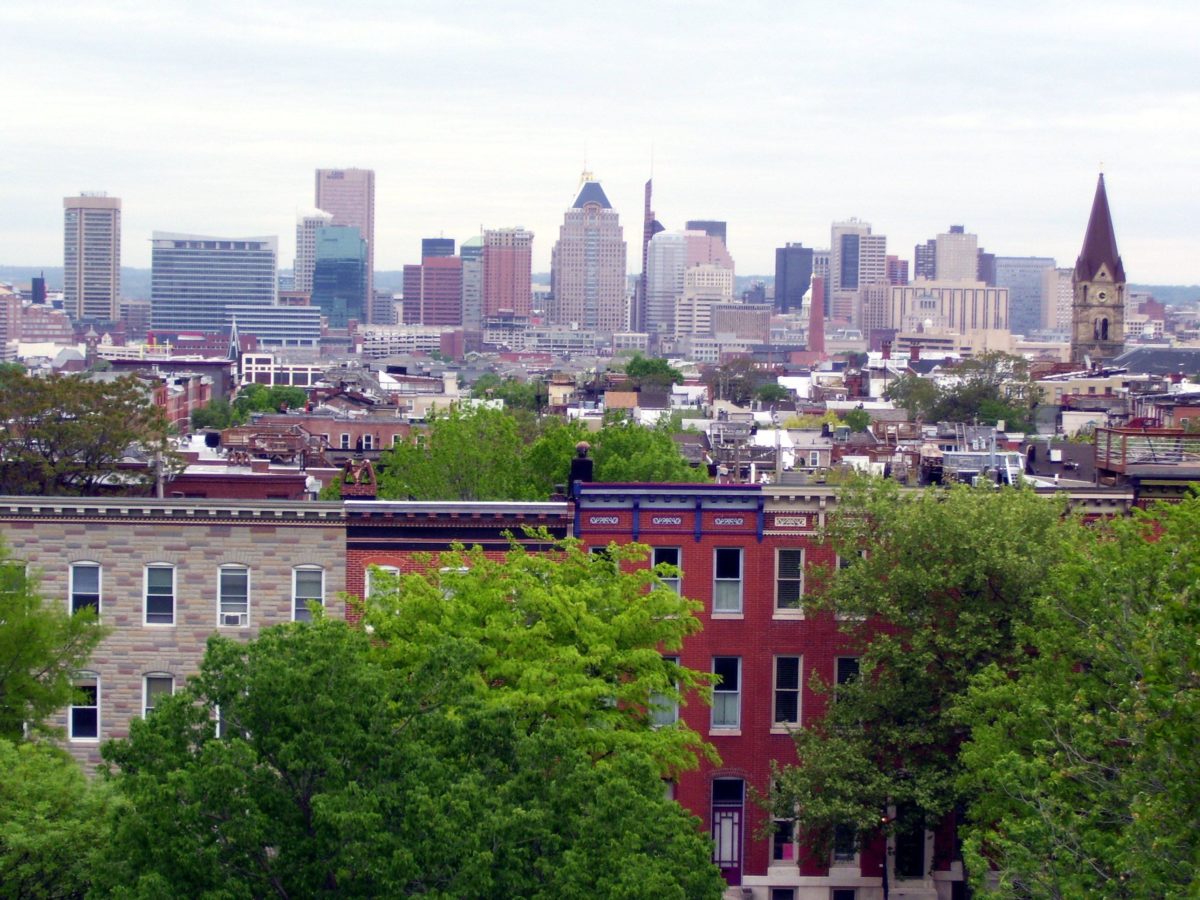Baltimore was famously the city where the first gas street lamp in America was lit for the first time. About 200 years later, inside a room overlooking Baltimore’s harbor at Brown Advisory’s Fells Point headquarters, the strategy director looking at the future of utilities for the company behind that moment talked about how cities such as San Diego are affixing sensors on street lights continue to illuminate other aspects of civic life.
“They’re trying to create an open platform using sensors on street lights to try to figure out, ‘How do we use that data?'” said Divesh Gupta, the director of strategy for Baltimore Gas and Electric’s (BGE) Utility of the Future division.
Smart city technology was the topic of discussion at Wednesday’s edition of the Waterfront Tech Series, the quarterly conversation series produced by Moxie Promotion. Yet the focus for initiatives that bring such sensors and other connected technology to the urban landscape should remain on people — not the flashy systems that enable them, panelists said.
That’s where it starts for initiatives within city government in Baltimore, said Shonte Eldridge, the City of Baltimore’s deputy chief of operations. Eldridge, who among a portfolio of leadership is responsible for supporting smart city initiatives in Mayor Catherine Pugh’s administration that will improve the quality of life for people in the entire city. It also brings the urban services offered by private companies backing rideshares and delivery to the public realm. (An early example in Baltimore: smart trash cans.)
In order to create the environment where the technology improves quality of life, Eldridge said, the community has to get involved.
“The city cannot do it alone,” she said, referring to the city government. “A smart city is the ecosystem making sure we all have a good quality of life for the city.”
A smart city is the ecosystem making sure we all have a good quality of life for the city.
This brings the opportunity to apply the technology to deeper issues, said Randy Knight, a senior project manager at Ruckus. The new solutions driven by a civic mindset have a role in “making sure that folks can get the services they need when they need them,” Knight said.
For the people building that technology, talking to residents is a key part of that community effort, said Gupta. So in the process of deploying new offerings, BGE surveys residents, business and others on what they need.
“It’s finding out, what are the uses that you’re looking for, and then building for them,” Gupta said.
Smart cities technology will also require upgrades to infrastructure. Marshall Pearsall, a senior project manager at KCI Technologies, said smart cities will ultimately be reliant on fiber internet and antennas. It’s part of the reason why the city is looking into municipal broadband and the state government is considering a bill around small cell antennas even as traditional land use concerns are causing debate.
Wireless in particular, said Pearsall, has gone from a nicety to a must have, for everything from job applications to public safety.
“It’s all driven through wireless devices,” he said — which is why conversations around preparations for 5G, or the fifth generation cellular network, have gotten louder. It also brings a need to secure the systems that are put in place, said Dave Krauss, a packet architect in the office of the CTO at Ciena.
“You want security to be part of the network itself, not just something that has been bolted on afterward,” Westdorp said.
In Baltimore, building a smart cities community also means talking to residents to be sure it's done in an inclusive fashion.
And in Baltimore, a city where the racial and economic divides that began with decades-old policies continue to play out, building a smart cities community also means talking to residents to be sure it’s done in an inclusive fashion.
A 2017 report from the Robert W. Deutsch Foundation showed that, as of 2013, nearly 75,000 households in Baltimore lacked internet access. In a separate study in which researchers from a group of local universities asked residents in low-income areas of West Baltimore what they wanted when it came to smart cities, they stressed the importance of expanded internet access.
“The heart of the issue is we do need 5G because we need it for the community,” said Todd Marks, CEO of Locust Point tech and marketing agency Mindgrub.
For city government, preparation for this work involves taking additional steps to build community alongside identifying tech priorities. A smart city committee has been formed to convene government with university, community and tech businesses such as Mindgrub. It’s also starting up a training program for ambassadors to provide information and assistance at the community level.
The process won’t be finished overnight, and there’s still more room to get involved, said Eldridge, concluding the event with an appeal to those present to join in. There’s some civic duty in networking, after all.
Before you go...
Please consider supporting Technical.ly to keep our independent journalism strong. Unlike most business-focused media outlets, we don’t have a paywall. Instead, we count on your personal and organizational support.
Join our growing Slack community
Join 5,000 tech professionals and entrepreneurs in our community Slack today!

The person charged in the UnitedHealthcare CEO shooting had a ton of tech connections

From rejection to innovation: How I built a tool to beat AI hiring algorithms at their own game

Where are the country’s most vibrant tech and startup communities?


